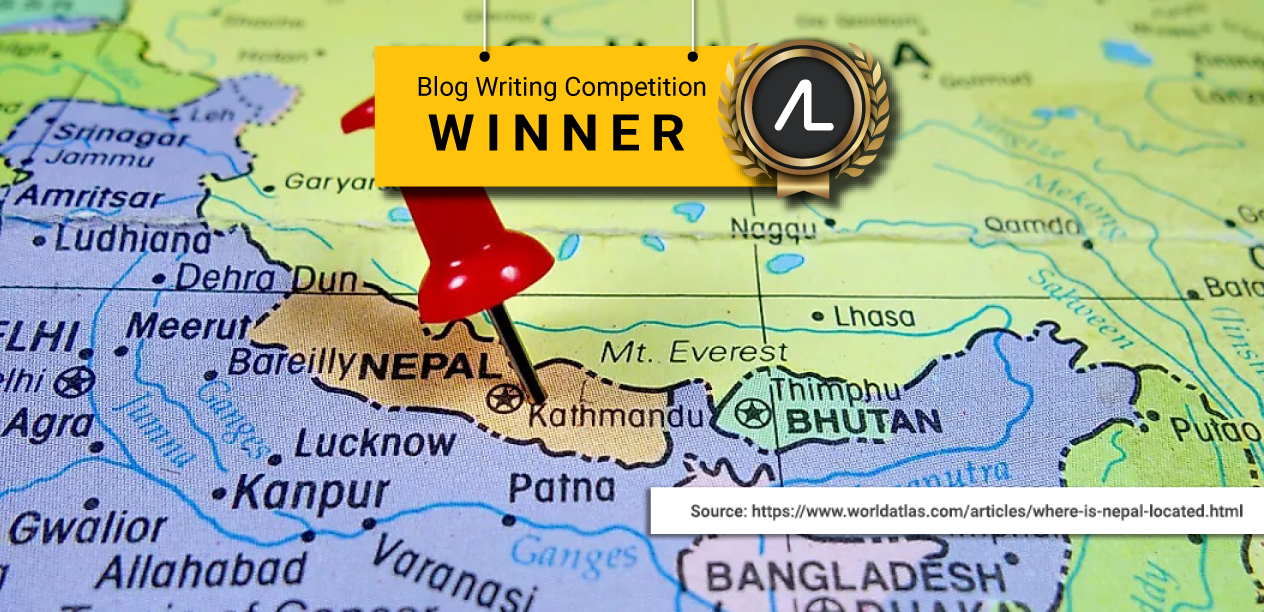
Nepal’s Shifting Geopolitical Dimension
Written by: Lumana Upreti
Lumana was a participant in the Blog-Writing Competition on Democracy, Geopolitics, and Foreign Affairs organized by Accountability Lab Nepal, and she was selected as one of the winners from over 50 submissions.
Nepal often has become a locus for geostrategic competition between India and China. India has a special relationship with Nepal characterized by an open border, culture, religion, and a people-to-people kinship. New Delhi’s response to sensitive issues, such as river treaties and border encroachment among others, has affected the Indo-Nepal relations[1]. Such experiences with India, combined with the communist regime in Nepal, allowed China to have a deeper influence on Nepali politics. However, China’s grip on Nepal appears to be slipping of late.
Chinese engagement in Nepal peaked when it signed the Belt and Road Initiative (BRI) in 2017 and President Xi Jinping visited Nepal in 2018. However, Nepal also signed the US Millennium Challenge Corporation (MCC) the same year. China viewed the MCC as a competition to the BRI as both the initiatives focus on infrastructure. Beijing perceived the MCC as an American attempt to encircle China[2]. Beijing believed the communist regime to be China-friendly, and hence, sought to keep the communist alliance and government in place.
Despite China’s efforts, the Nepal Communist Party split in 2020. It showed shortcomings in China’s approach and a lack of understanding of Nepal’s politics. China put its eggs in the ‘communist’ basket alone and faced the consequence when the basket broke.
Subsequently, the change of government led to a shift in Nepal’s foreign policy. China had scant confidence in Prime Minister Sher Bahadur Deuba’s led coalition government. Some Chinese state publications label Deuba as pro-India and pro-West.
Further, the US engagement sharply increased with the new administration with multiple rounds of visits of US officials and correspondence laying particular emphasis on the MCC. There has been a noticeable shift in the US policy towards South Asia, encompassing Nepal, in recent years[3]. This made China anxious. American assertiveness in pushing Nepal to ratify the MCC also alarmed China. Several Nepali news reports suggested that China served to craft anti-MCC rhetoric in Nepal and prompted people to mass demonstrations against the pact[4].
China repeatedly raised reservations about the agreement. The Chinese Foreign Ministry Spokesperson alluded that the MCC was a “pandora’s box” and the US is practicing “coercive diplomacy” in Nepal[5]. Regardless, Nepal’s parliament ratified the MCC.
Chinese Foreign Minister and State Counselor Wang Yi visited Nepal to repair the damage. One of the primary priorities of Wang Yi’s visit was to strengthen Nepal’s participation in BRI initiatives. Nepal’s analysts have viewed this visit as China’s “damage control” move. China found it necessary to assert itself as a major actor in Nepal and send a signal to its strategic competitors (India and the US) by stating, “China opposes any attempt to undermine Nepal’s sovereignty and independence and interfere in its internal affairs and engage in geopolitical games”[6].
However, China’s efforts to preserve its influence in Nepal through BRI faced another setback. Prime Minister Deuba unequivocally stated that Nepal desired projects under grants or soft loans. Additionally, Nepal asserted that bids for BRI projects should be open for all, not just the Chinese firms[7].
Change in government often brings changes in policies in Nepal. It has affected foreign policy engagements and priorities as seen in the Budhi Gandaki power project[8]. Nepal and India agreed on a strategic plan to deepen collaboration on cooperative power production projects in Nepal. India granted the Nepal Energy Authority approval to sell an extra 325 MW of electricity to India[9]. Nevertheless, the Indian policy for power import excludes imports from projects with investment from Chinese companies[10]. Deuba’s recent visit to India reignited High-level political interaction between the two nations. The rekindling of Nepal’s relationship with India and Deuba’s growing personal relationship with India’s ruling party (BJP) is also a cause of concern for China.
Maintaining a balance between regional and global forces remains Nepal’s most challenging task. It cannot risk riling one power at another’s expense. For the past seventy-five years, the US has been Nepal’s most significant development partner, and its role cannot be negated. Similarly, Nepal is economically reliant on India and China, which are its neighbors.
Nepal’s economic reliance on the emerging global powers makes having geopolitical ramifications nearly inevitable. Therefore, with the increased engagement of all three powers in Nepal, geopolitical tension has increased. Nepal should pursue an independent foreign policy and establish diplomatic equilibrium with all three forces, keeping national interests in mind.
- Sigdel, Anil. China’s Growing Footprint in Nepal: Challenges and Opportunities for India. Oct. 2019, www.orfonline.org/wp-content/uploads/2018/10/ORF_IssueBrief_260_India-Nepal_FinalForUpload.pdf.
- https://kathmandupost.com/columns/2022/03/28/beijing-s-preference-to-reset-ties.
- Bhattarai, Kamal Dev. “US Engagement in Nepal to Grow, with or without MCC.” https://theannapurnaexpress.com/News/Us-Engagement-In-Nepal-To-Grow-With-Or-Without-Mcc-3792, Nov. 2021.
- https://english.khabarhub.com/2021/07/207680/.
- https://english.khabarhub.com/2022/18/237924/.
- https://www.globaltimes.cn/page/202203/1256876.shtml.
- https://economictimes.indiatimes.com/news/international/world-news/no-agreement-on-belt-and-road-initiative-as-nepal-toughens-stand-amid-chinese-fm-visit/articleshow/90473704.cms.
- https://english.onlinekhabar.com/revive-budhigandaki-hydropower.html.
- https://kathmandupost.com/money/2022/04/07/nepal-gets-approval-to-export-325mw-more-power-to-india.
- Jha, Hari Bansh. “Major Breakthrough in Nepal–India Relations: Prime Minister Sher Bahadur Deuba’s Visit to India.” ORF, 12 Apr. 2022, www.orfonline.org/expert-speak/major-breakthrough-in-nepal-india-relations/





